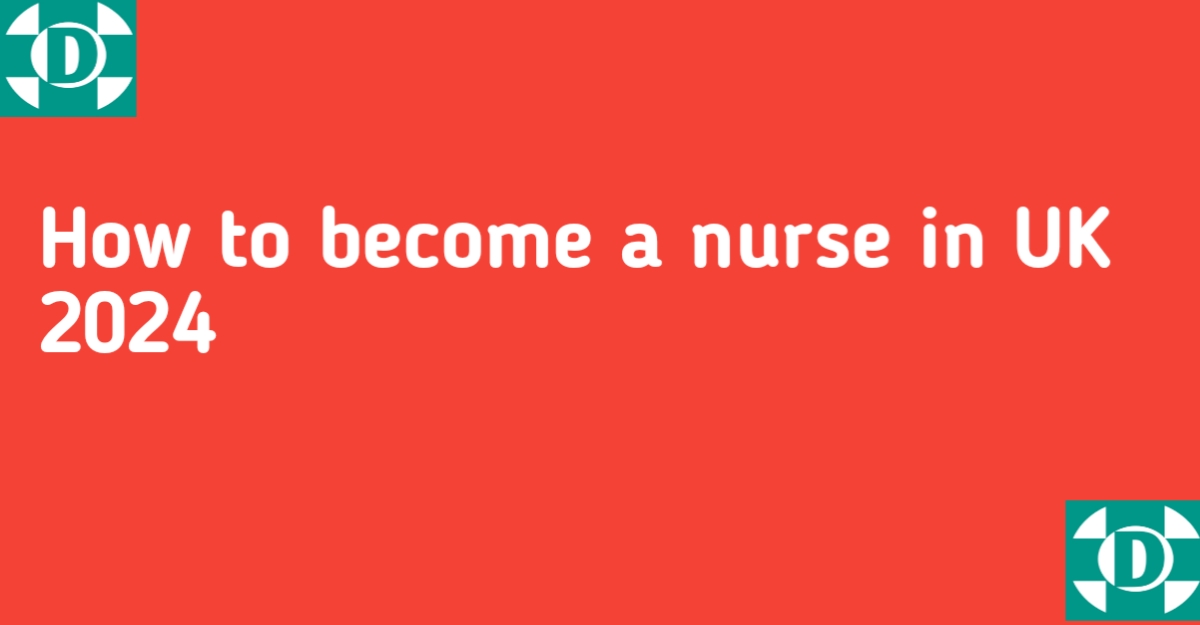How to become a nurse in UK 2024

How to become a nurse in UK (United kingdom)
To work as a nurse, you need a degree in nursing and you must be registered with the Nursing and Midwifery Council (NMC). You’ll need to choose which of the four nursing specialism’s (adult, children, mental health, or learning disability) you’d like to study.
This easy to understand explanation for the benefits of public.
People interested in career nursing came to right place.
In the united kingdom, the traditional BSN programs require four years of full-time study.
However, students who have LPN or RN licensing, or a bachelor’s degree in a different field, might qualify for alternative BSN programs that could be completed in one to two years.
Entry Requirements for Nursing Degree in the UK
International students must have completed secondary education equivalent to UK qualifications, such as A-levels or International Baccalaureate (IB) and all international students are required to demonstrate proficiency in the English language.
Read also: How to become ICU nurse: Responsibilities, certificate and salary
The UK Nursing and Midwifery Council (NMC)
NMC, that is the Nursing and Midwifery Council is the professional regulatory body for nurses, midwives and nursing associates in the UK. Their role is to protect patients and the public through efficient and effective regulation.
Therefore to become a registered nurse in the UK you must have successfully completed a nursing programme that is approved by NMC United Kingdom. Also must meet the NMC’s requirements of good health and character.
In June 2022 there were 704,520 registered nurses in the UK. A Nursing degree is widely considered to be one of the most employable in the UK – 94% of nursing students find jobs within six months of finishing their nursing course.
If you’re eligible studying nursing in the UK you can also receive at least £5,000 in financial support annually during your degree study.
Read also: Nurse practitioner Aspirant, Best steps become one in 2024
Overview of becoming nurse in UK
Studying Nursing degree in UK to become a registered nurse need you to make decisions and decide which field of nursing you want to study in, know that there are four fields of nursing that you need to study at beginning and are: adult nursing, children’s nursing, learning disability nursing add mental health nursing.
It’s permitted to study nursing in two fields mentioned above that can be achieved by studying a degree courses that allow you to study in two of the fields. These are known as ‘dual field’ degrees. Once you have qualified you’ll be able to work as a nurse anywhere in the UK and even internationally.
Read also: Top 10 humanitarian aid organizations in the world (NGOs)
UK Entry requirements for nursing degree courses
According to https://www.healthcareers.nhs.uk on their article “how to become a nurse” in UK, the entry requirements for nursing degree in UK vary and it is depend on university’s own entry criteria, but in a nutshell you are likely to need at least:
Two (usually three) A-levels or equivalent qualifications at level 3.
Supporting GCSEs including English, maths and a science (usually biology or human biology).
You can visit the administration department of universities directly to find out whether qualifications equivalent to A-levels or GCSEs are acceptable.
Courses often specify preferred or essential A-level or equivalent subjects, such as one science (for example biology) or social science (for example psychology). Some universities offer courses with a foundation year for those without the necessary entry qualifications.
what are Level 3 qualifications?
– Pearson BTEC Level 3 Diploma qualifications
– Scottish Highers/Advanced Highers
– International Baccalaureate (IB)
– OCR Cambridge Technicals
– Access courses, e.g. Access to Nursing
In some cases, you may be able to combine academic and vocational qualifications (like an A-Level with a BTEC).
To find details about the programme and the nurse’s work go to this http://www.nhscareers.nhs.uk/ then search for the approved programme by the nursing and midwifery council of UK at https://www.nmc.org.uk/education/approved-programmes/
How to Apply for Nursing Science study in UK
UCAS https://www.ucas.com/ guide you through your journey. To apply for nursing in UK apply through UCAS, most of the full-time university courses application are made through using UCAS application syse. However applicants can directly contact universities management for more explanation about their criteria for part-time or postgraduate courses.
Read also: Types of nurses and salaries top 10 in the world
UK NMC Nursing Study and Training
In the UK, NMC is responsible for regulating Nursing studies, trainings and activities.However nursing education and training programmes are only run at NMC’s approved educational institutions (AEIs) based in health and social care settings. Courses usually take a minimum of three years to be completed, although entry routes are available which take into account your previous learning. Please read NMC’s section below about accreditation of prior learning (APL) for further information.
“Some students may have previous relevant learning, including formal certified learning such as an access course or another degree, or practice-based learning that was part of another course or gained through paid or voluntary work. Evidence of this learning may contribute to meeting some programme requirements, assessed through the AEI’s own APL process. Up to a maximum of 50 percent of the programme can be accredited in this way”.
source: https://www.nmc.org.uk/education/becoming-a-nurse-midwife-nursing-associate/becoming-a-nurse/
Nursing training takes place at an NMC approved educational institution, with half of the programme based in clinical practice with direct contact with patients and families. This could take place in the home, community, hospitals, and independent and voluntary sector organisations.
What Nurses are being Taught During the programme?
Student’ are being taught to understand patients care
Promote and facilitate safe and effective patient care.
They are also taught when to call for assistance.
Implement emergency measures, often working with other health professionals.
In general promoting health and wellbeing is an important role and responsibility of registered nurses. Students learn and are assessed on how to provide unbiased information and communicate effectively with a range of patients, families and other healthcare professionals.
Read also: How to become ICU nurse: Responsibilities, certificate and salary
UK’s Nurses Growth Statistics
According to nurses.co.uk In total, 52,148 people joined the NMC Register as registered nurses in the last year.
Currently, there are 731,058 Nurses on the permanent NMC register in the UK as of March 2023. This is up from just over 700,000 the previous year. The total number of people on the NMC permanent register is 788,638.
This includes Nurses, Midwives, and Nursing Associates.
Figures from NMC Register March 2023-24
587,885 = Adult Nurses
95,485 = Mental Health Nurses
57,014 = Children’s Nurses
16,840 = Learning Disability Nurses
All categories saw a year-on-year increase between 2022 and 2023, with the exception of LD Nurses which slightly decreased in number.
Nurses salary in UK
The current starting salary for a Band 5 Nurse in the UK is £28,407 per year (minus tax and pensions).
Recap
Becoming a nurse
How to become a nurse and find a course in the UK
All nurses working in the UK must be registered with us. Before registration, they must have successfully completed a nursing programme of education that is approved by us. They must also meet our requirements of good health and good character.
Education and training
In the UK, nursing education and training programmes are only run at our approved educational institutions (AEIs) based in health and social care settings. Courses usually take a minimum of three years, although entry routes are available which take into account your previous learning. Please read our section below about accreditation of prior learning (APL) for further information.
Nursing training takes place at an NMC approved educational institution, with half of the programme based in clinical practice with direct contact with patients and families. This could take place in the home, community, hospitals, and independent and voluntary sector organisations.
Methods
During the programme, students are taught to understand, promote and facilitate safe and effective patient care. They are taught when to call for assistance and implement emergency measures, often working with other health professionals.
Promoting health and wellbeing is an important role for nurses. Students learn and are assessed on how to provide unbiased information and communicate effectively with a range of patients, families and other healthcare professionals.
Nursing degree apprenticeships
Some people choose to take nursing degree apprenticeships as an alternative to traditional degree courses.
Nursing degree apprenticeships are, like all apprenticeships, employer-led. The employer releases the apprentice to study at an approved education institution and in a range of practice settings so apprentices can get the full range of skills and knowledge that we require for registration. Apprentices will need to achieve the same high standards that we expect from students who take the traditional degree course before they can join their register.
Universities and practice placement partners also have to apply the same standards throughout their courses if they’re running apprenticeships, including when deciding who gets a place on the course.
Find out more about becoming an apprentice.
Read also: Countries That Need Nurses in 2024
Where to find training programmes
You can find details about the training programmes and the work nurses do from NHS Careers.
For a list of institutions approved by us to provide pre-registration nursing programmes please search our approved programmes.
Students normally apply to training programmes through the Universities and College Admissions Service (UCAS).
Accreditation of prior learning (APL)
Some students may have previous relevant learning, including formal certified learning such as an access course or another degree, or practice-based learning that was part of another course or gained through paid or voluntary work. Evidence of this learning may contribute to meeting some programme requirements, assessed through the AEI’s own APL process. Up to a maximum of 50 percent of the programme can be accredited in this way.


